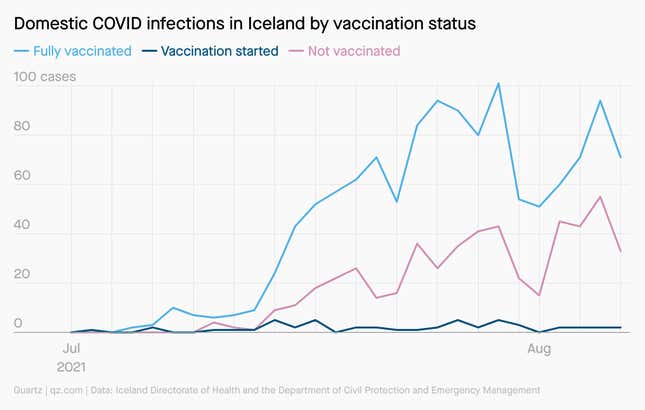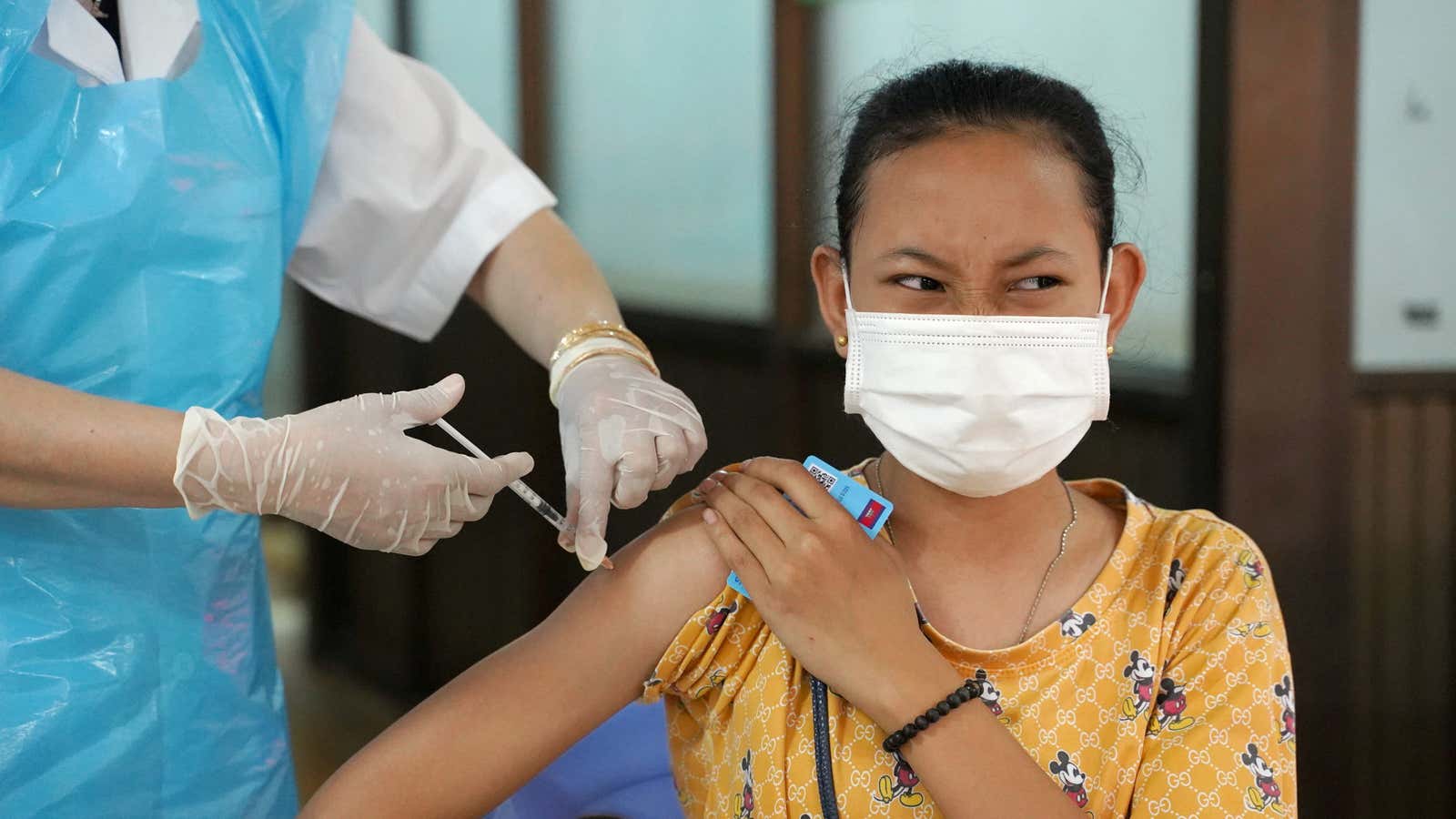Hi Quartz readers,
As the highly infectious delta variant moves across the world, a growing number of vaccinated folks are testing positive for Covid-19. That has prompted some countries—including Israel, Germany, Hungary, France, and Russia—to announce plans for additional vaccine shots. In the US, Pfizer said it will submit data on a third shot for emergency use authorization, but the FDA and CDC pushed back, issuing a joint statement to the effect of, “No need, at least not yet.”
That assessment might seem foolhardy considering America’s rising case counts. But it’s backed by science: All available evidence indicates the vaccines are still working as they should. Breakthrough infections definitely exist, but they remain relatively rare, and the vast majority of severe cases are among the unvaccinated.
Booster shots do raise an ethical quandary—rich countries are debating a third shot while many people wait on their first—but that quandary also has epidemiological implications. Unvaccinated populations create pockets in which the virus can mutate into variants that could be more infectious, virulent, or resistant to vaccines.
“Once a variant occurs that can really start evading vaccine effectiveness in a significant way, we’re back to where we started,” says Maureen Miller, a professor of epidemiology at the Columbia Mailman School of Public Health. “Until 90% of people are vaccinated… it could mutate and come back and undo everything we’ve done.”
The WHO confirmed as much in its own position on boosters: Additional shots risk deepening global inequalities, and the most pressing issue is getting people in poor countries vaccinated. “I understand the concern of all governments to protect their people from the delta variant,” WHO director-general Tedros Adhanom Ghebreyesus said recently. “But we cannot accept countries that have already used most of the global supply of vaccines using even more of it, while the world’s most vulnerable people remain unprotected.” —Alexandra Ossola
✦ We can get behind some boosters. Specifically, all the Quartz members whose support makes our journalism possible. Thanks for being you! (And if you’re not a member yet, take 40% off your first year with the code QZEMAIL40.)
You asked…
…some great questions about vaccine mandates.
- Are they legal? Yup. In the US, states can mandate vaccines, and private companies can insist on vaccination for their employees and customers. Other countries starting to implement vaccine requirements include France, Germany, and Italy.
- Do they violate human rights? As long as religious and medical exceptions are made, no. The unvaccinated are not a protected class, and human rights give all people the right to be protected from harm.
- How will they be enforced? Some places are beefing up signs, staffing, and training. But even if enforcement is lax, just the threat of it convinces people to get vaccinated.
7 talking points
💪 Try being a “vaccine champion.” Champions change minds through caring, repeated conversations that chip away at outstanding concerns about vaccines.
🧑🎓 India’s largest vaccine maker is paying students. A Serum Institute version of the AstraZeneca vaccine isn’t approved globally, so Serum’s CEO set aside $1.35 million for Indian students struggling with restrictions abroad.
🏡 America’s biggest home renter is a 2021 top stock. Shares of Invitation Homes are up more than 40% this year, double the growth in the S&P 500 Index of large US stocks.
💸 No vax? Prepare to pay more for health insurance. Why should patients be kept financially unharmed from what is now a preventable hospitalization?
💉 Moderna had another bumper quarter. In the second quarter of 2020, the company’s revenues were just $67 million. In the same quarter this year, its Covid-19 vaccine alone registered $4.2 billion in revenue.
🤔 Asian Americans like being doctors, but not seeing them. Asian Americans make up 7% of the US population, but represent more than 17% of practicing physicians.
💡 A failed German vaccine could help fix the global shortage. CureVac’s attempted vaccine was only 47% effective, but the company set up a supply chain that could be used to produce a different shot.
Lessons from Reykjavik
For an interesting case study on breakthrough infections, cast your eyes upon Iceland, where 96% of females and 90% of males 16 years or older have received at least one dose.
Covid-19 vaccines were first administered in Iceland at the end of 2020; by mid-July, every resident over the age of 16 was offered a shot. Yet tests show an alarming number of Covid-19 infections are still happening with the onset of the delta variant. Given the lopsided numbers of vaccinated versus unvaccinated people, the island country is actually seeing more cases of Covid-19 among the vaccinated than the unvaccinated.

The difference is severity: Iceland has reported just one death in 2021, on May 25. That’s a good sign that vaccinated people who get the virus are generally recovering without serious illness.
Stretch legstrong
Even Levi’s is buying yoga pants now. The denim maker recently acquired Beyond Yoga, a US-based seller of yoga clothing and casual sportswear. In its announcement of the deal, Levi’s said the purchase allows it to break into the thriving activewear market.
How thriving? In the first half of 2021, sales of activewear in the US were up more than 40% compared to the same time last year, and more than 25% over 2019 levels.
Elsewhere on Quartz
- No, we sell furniture: Ethan Allen changed its stock ticker to avoid confusion with Ethereum.
- Under the umbrella: This is how LVMH helped make Rihanna a billionaire.
- Coolcoolcool: Google is developing a superintelligent AI to perform millions of tasks.
- Keeping it Hushpuppi: A Nigerian internet scammer is now an action-movie villain.
- Comp counselor: US kids are attending hundreds of AI summer camps.
- Sneak attacks: Stop waiting for a “cyber Pearl Harbor.”
Our best wishes for a healthy day. Get in touch with us at [email protected], and live your best Quartz life by downloading our iOS app and becoming a member. Today’s newsletter was brought to you by Alexandra Ossola, Lila MacLellan, Sarah Todd, Michelle Cheng, Clarisa Diaz, Marc Bain, and Kira Bindrim.
